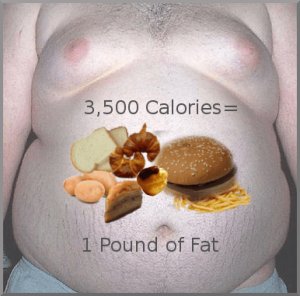The Seventh Weight Loss Basic:
Understanding Calories
If you have read, and acted upon, all the previous articles in Understanding Weight Loss Basics and are still with me, good, you’re doing just fine. Now, In Understanding Weight Loss Basics – 5 we’ll discuss the seventh weight loss basic: Understanding Calories
Understanding Weight Loss Basics – 5:
What Are Calories?
A single calorie is the energy needed to raise the temperature of one gram of water by one degree centigrade.
This is such a tiny amount of energy that when referring to the calorific value of food they are measured as kcals, or the metric equivalent, kjoules (sometimes referred to as kj), both being the equivalent of one thousand calories.
Originally used in the various fields of engineering, but now only used to measure the calorific value of food and the amount of energy your body needs to carry out its daily tasks.
Understand Weight Loss Basics – 5: Understanding Calories is based on the 3,500 calories=1 Pound of Fat principle. By reducing the number of calories below what your body needs daily, it will burn fat to supply the extra calories needed.
Your Basal Metabolic Rate (BMR) controls the amount of calories your body needs to carry out its daily tasks. If you are one of the lucky minority who have a fast BMR your body will use the calories it needs and burn off the rest, keeping your weight stable. If you are in the majority who have a slow BMR, your body will use the calories it needs and store the rest as fat, leading to weight gain.
Understanding Weight loss basics 5:
How Do Calories Work?
The advice given, universally, by the majority of doctors and health experts for long-term healthy weight loss is based on the 3,500 principle, being that one pound of fat contains 3,500 calories.
that one pound of fat contains 3,500 calories.
Put quite simply, if your body needs 3,000 calories daily and you consume 3,500, in one week you may have a weight gain of one pound, 500 x 7 = 3,500, the amount of calories in one pound of fat.
By the same token, if you reduce your daily calorie consumption from 3,000 to 2,500 you may have a weight loss of one pound by virtue of the fact that your body will burn five hundred calories of fat daily to supply the 3,000 that your body needs.
Notice I use the words may and not will as there is no guarantee that you will lose one or two pounds a week, a lot depends on your age, weight, sex and the type of weight loss diet.
The above figures are only given as an example and may vary for each individual according to their BMR and level of daily activity.
Does the 3,500 weight loss principle work? New research in America claims it is wrong and misleading people. Although it has been known for many years that calorie reducing dieting actually slows the metabolism over time and the amount of weight loss will vary according to a person’s age, weight and sex.
They say that it can take three years for the body to adjust to weight loss, and, by reducing their calorie intake by one hundred calories daily, can expect to lose ten pounds over three years. (Note the word is expect not will.)
Is it hard to reduce you daily calorie consumption by one hundred calories a day? Take a look.
- If you drink tea or coffee with whole milk, just two cups a day using skim milk instead can save one hundred calories a day.
- If you take sugar with your tea or coffee you can reduce this even further. One teaspoon of brown sugar contains twelve calories; one teaspoon of granulated sugar contains sixteen calories.
- What about non-diet carbonated soft drinks? Ranging from one twelve ounce cola at one hundred and thirty seven calories to one twelve ounce carbonated orange drink at one hundred and seventy nine calories, skipping one non-diet carbonated drink a day will cut out well over the suggested calorie reduction.
- Do any exercise? No? One hours power walking burns six hundred calories. Just a brisk ten-minute walk will burn off one hundred calories.
While I am no position to dispute this new research, I would ask the question: Have these figures been tested and proved successful over a three year period or are they still to be proved?
I have seen and read many successful cases of healthy long-term weight loss using the 3,500 principle and all of them have lost a lot more than ten pounds in three years and, once they have established their calorie maintainance level, they have maintained their desired weight.
Just one word of warning. Unless advised by your medical practitioner, and under medical supervision, the recommended minimum daily calorie intake is 1,400 for men and 1,200 for women. This amount provides the energy for the average person to carry out normal everyday tasks.
I hope Understanding Weight Loss Basics – 5 has given you some idea of how, by controlling your daily calorie intake, you can control your weight. You should now be ready for the next article in the series: Dieting For Weight Loss.
